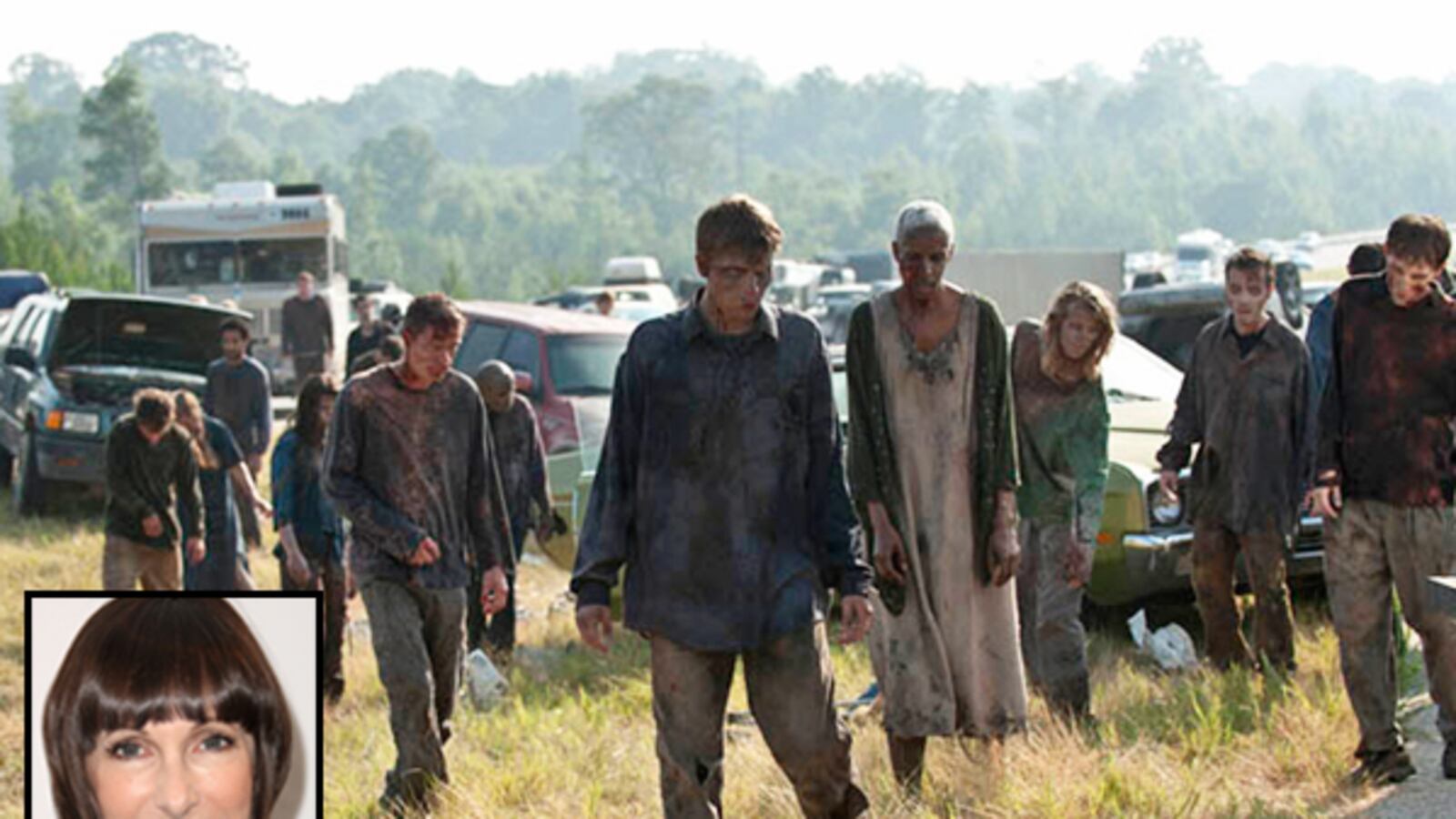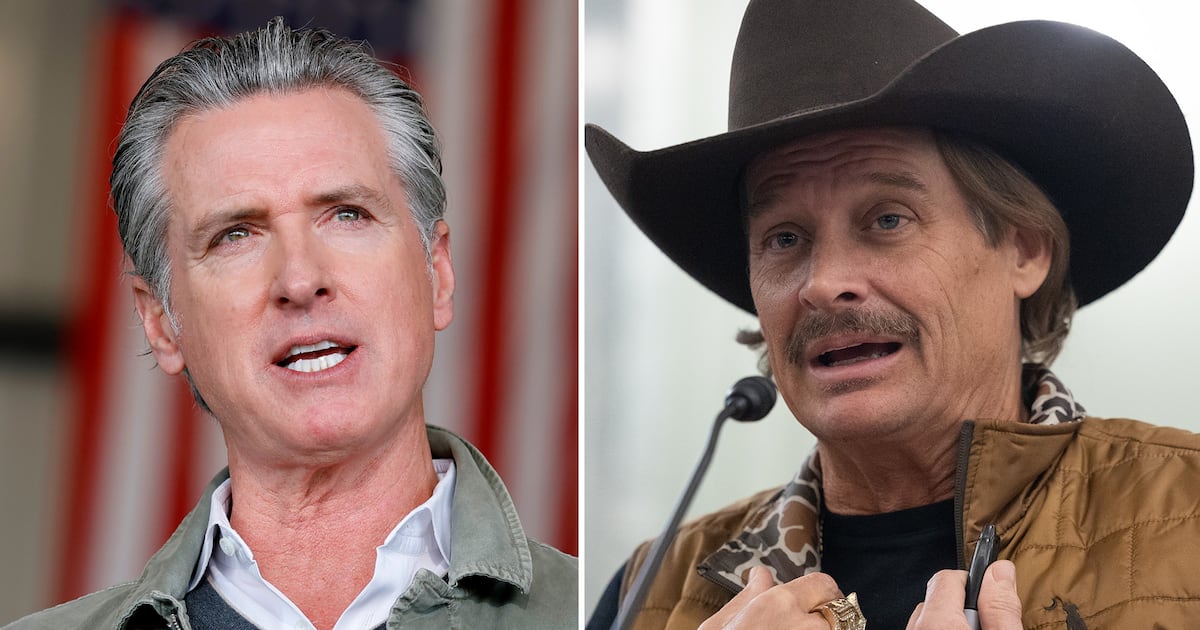On a quiet street in Pasadena in the shadow of the historic Rose Bowl, is Vertical, a wine bistro celebrating its fifth anniversary this week. Owned by Gale Anne Hurd—the film and television producer behind such hits as The Terminator, Aliens, and AMC’s The Walking Dead, which returns Sunday evening for its second season—the sleek and modern space combines the antique exposed bricks of the 1906 building with cutting-edge vellum light fixtures. It's a far cry from the horror-filled killing fields of the zombie drama.
The Walking Dead has proven to be AMC’s biggest hit, luring 6 million viewers to the season finale of its dystopian drama, which envisions the attempts of a band of disparate strangers to survive in a world where nearly everyone they encounter wants to eat their flesh. The show, a hit for the Comic-Con age and based on a best-selling graphic novel series by Robert Kirkman, has been so successful that the cable network is spinning off a live after-show—Talking Dead—to air following encores of each episode.
But the drama behind the scenes has been almost as fast and furious as the show’s stomach-churning action sequences. Earlier this year, showrunner Frank Darabont fired the writing staff he had assembled for the first season of The Walking Dead; rumors of budget cuts coincided with very public contract renegotiations at AMC over critical darlings Mad Men and Breaking Bad; and there was vocal viewer frustration over the news that Season 2 would be split into two halves. Financially, AMC’s parent company, Cablevision, opted to spin off AMC and its sister cable channels with an IPO; AMC likewise opted to make itself look as budget-conscious as possible, reportedly slashing the budget of Season 2 of The Walking Dead by as much as $650,000 per episode. (It’s worth noting, additionally, that it’s the first show that AMC has produced entirely in-house.) Then came the axe: days after appearing at San Diego Comic-Con to promote the show, Darabont was mysteriously fired in July, with no real public explanation as to the reasons behind his sudden departure.

Over a flight of merlot, Hurd, 55, petite and immaculately dressed, rejected the notion that viewers would be more concerned about the struggles behind the doors of AMC than about that of the show’s characters. “It certainly was in the forefront of our minds,” she said, “but when you consider the 6 million people who watch, they’re watching the show, not reading about the drama not seen on the screen.”
A year ago, AMC may have been cable television’s golden boy, but despite numerous Emmy Awards and critical acclaim, the backlash against the network has become palpable in recent months. (AOLtv’s Maureen Ryan captured the outrage over the season finale of The Killing by writing, “This hour was, in my opinion, the worst season finale of all time, because it was a terrible execution of a set of colossally stupid, misguided and condescending ideas. And clearly, people at the network have known about what would be in the finale for some time. They should have stopped it. All of it.”)
Hurd was less willing to point the finger of blame at the network. “None of us know the pressures that the executives are under,” she said. “We see everything through our own filter: how does it affect the show; how does it affect me? None of us know. The network has been spun off … There’s probably more pressure than there was before when it was part of a large organization.”
No explanation has been given for Darabont’s firing, with rumors continuing to swirl about the possible rationales for letting the auteur go. Hurd said that she was told simply by AMC, “We’re making a change.” (As for budgetary reasons stemming from Season 1 overages, Hurd said, “We were on budget last season; in fact, we were under budget.”) Darabont, meanwhile, has not commented publicly about his departure.
What the cast and crew—as well as newly minted showrunner Glen Mazzara, who was promoted in the wake of Darabont’s departure—have had to do, said Hurd, was to put their heads down and focus on the work. And they were lucky that it was Mazzara, who had written for the show’s first season, who was stepping up. Hurd and Darabont, who have worked together for years, remain close.
“It was shocking,” Hurd said. “As brutal as it was on a number of levels—especially because Frank is one of my closest friends—to his credit, Frank told everyone, ‘Carry on.’ That was the message that was given to the cast and crew … There’s speculation from all sides, but the show’s going to be fine.”
Under Mazzara, the crew has carried on, delivering a second season that expands upon the dynamics and struggles of the survivors, including former sheriff Rick Grimes (Andrew Lincoln); his wife, Lori (Sarah Wayne Callies); his best friend, Shane (Jon Bernthal), who embarked on a passionate affair with Lori while Rick was in a coma; Rick’s young son, Carl (Chandler Riggs); civil-rights lawyer Andrea (Laurie Holden); RV owner Dale (Jeffrey DeMunn); and pizza boy Glenn (Steven Yeun). The Walking Dead itself is about more than marauding flesh-eating ghouls, but about surviving in the face of unspeakable terror: to try to raise a child, to save a marriage, to deal with racism or jealousy or rage, to find a home when the world has turned upside down. It’s a show that traffics in an atavistic reaction to horror but also in moments of transcendence and peacefulness, seconds of beauty that are brutally broken.
“We’ll continue to have those moments,” Hurd said. “To give them credit, AMC didn’t look at this show and say, ‘Oh, this is a horror show for those FearFest fans, and it doesn’t need to be polished … There’s a lot of emotion.”
“I remember at one of the very first meetings we had with AMC, they said, ‘A zombie show on AMC is very different from a zombie show on network television. You don’t have to have zombies in every episode. We want the show to have enough richness and depth that you don’t need that.’ If we’re going to have zombies, there’s a reason for them. It’s not just a formula: ‘It’s been six minutes, we better have a zombie.’”
Zombie drama aside, Hurd is no stranger to beating the odds. She started her career working as an assistant for Roger Corman after earning a degree in economics. (She earned $180 a week, whether she was Corman’s executive assistant or the head of his marketing department. “I never got a raise,” she said.) It was at Corman’s New World Pictures that she met James Cameron, whom she later wed. (She has a 20-year-old daughter, Lolita, with her second husband, Brian De Palma, and is now married to director Jonathan Hensleigh.)
In 1984, she and Cameron (along with co-writer Bill Wisher) created The Terminator, which would go on to become a lucrative global franchise phenomenon, make a star out of its lead Arnold Schwarzenegger, and spawn a number of sequels. “He did most of the writing; I did a lot of the editing,” Hurd said. “It wasn’t like we were sitting side by side writing on yellow legal pads, which is how Jim wrote scripts.” But no one was interested in financing a film about a time-traveling cyborg assassin from the future stalking a young woman.
“Against all odds, we persevered … The film was rejected by everybody and not rejected with kind words, but basically, ‘Don’t let the door hit you on the ass on the way out,’” said Hurd. “It was naïveté that made us believe if we kept knocking on those doors, someone was finally going to say yes.” Eventually, they were able to secure financing from HBO and the now defunct production company Orion, among others.
Terminator, which cost $6.4 million to produce, was a surprise success at the box office, and catapulted both Hurd and Cameron to the A-list. Hurd went on to produce such films as Aliens, The Abyss, Terminator 2, and a long string of action projects. (The sole comedies on her CV are Dead Man on Campus and Dick, the 1999 Michelle Williams–Kirsten Dunst Watergate comedy, which Hurd said was “marketed to an audience that didn’t appreciate it.”)
One of the Terminator franchise’s conceits revolves around the creation of Skynet, an artificial intelligence that becomes sentient and tries to end humanity’s hold on the planet. Recounting Apple’s new iPhone “personal assistant” Siri, which many describe as the first step toward handheld artificial intelligence, Hurd doesn’t hesitate to recall the prescience of The Terminator. “Wow,” she said. “It’s Skynet.”
The dark side of technology has proven to be a recurring theme in many of the works that Hurd has a hand in. “It’s why we called the bar in The Terminator Tech Noir,” she said. “We’re already losing our humanity. That technology Jim and I couldn’t have envisioned back then—or maybe Jim could because he’s really a genius—but we knew that people would be interacting more with their technology and not each other, and I see that. I go to restaurants where there are five people sitting at a table and they’re not talking to each other—they’re texting, maybe to each other. But they interface through technology. It’s a dangerous trend, and I think that war is being waged that way. Drones. It’s like a videogame to the people who are manning them. We’re losing our humanity and becoming more comfortable with machines.”
What’s interesting is that The Walking Dead is perhaps the most anti-technological show in existence. Season 2 finds the group encountering Hershel’s Farm, a self-sufficient farmstead that offers an oasis. Or until outside forces send the characters on their way.
“There’s an emotional context: When you find a safe haven, what happens?” said Hurd. “Humanity needs to believe that it can find someplace that’s safe; that keeps people going. Humanity wants answers to questions, and if we can’t answer them we will believe that there’s a power or entity that has the answers. They can’t get any answers from Jenner at the CDC [at the end of Season 1]. Do you talk to God? What do you do? You find a place that seems lost in time where there’s still electricity and there’s still humanity. How do you cope with the fear that that’s all going to be taken away from you? It’s worse than if you never had it in the first place.”
Even if the group encounters some creature comforts, they won’t be jumping on the Internet any time soon. The show has turned down requests for product placement from Bing and an unnamed airline (“OK, so there are zombie pilots flying the planes?” asked Hurd, chuckling), instead focusing on the lack of technological options available to the survivors of a global zombie disaster.
For fans of Hurd’s tech-heavy films it may come as a bit of a surprise that the producer is quite so distrustful of technology and its implications about the way in which we live our lives. But The Walking Dead proves that it’s possible to start over in this world, even without an iPad or an Internet connection. “It’s a great show for Luddites,” Hurd said with a laugh.






